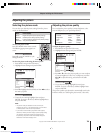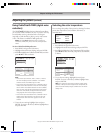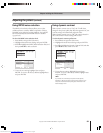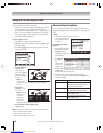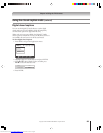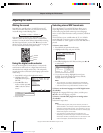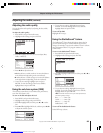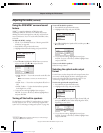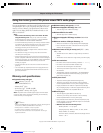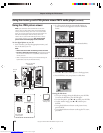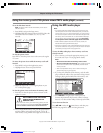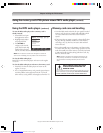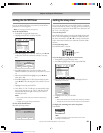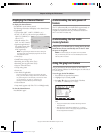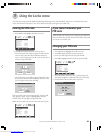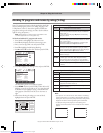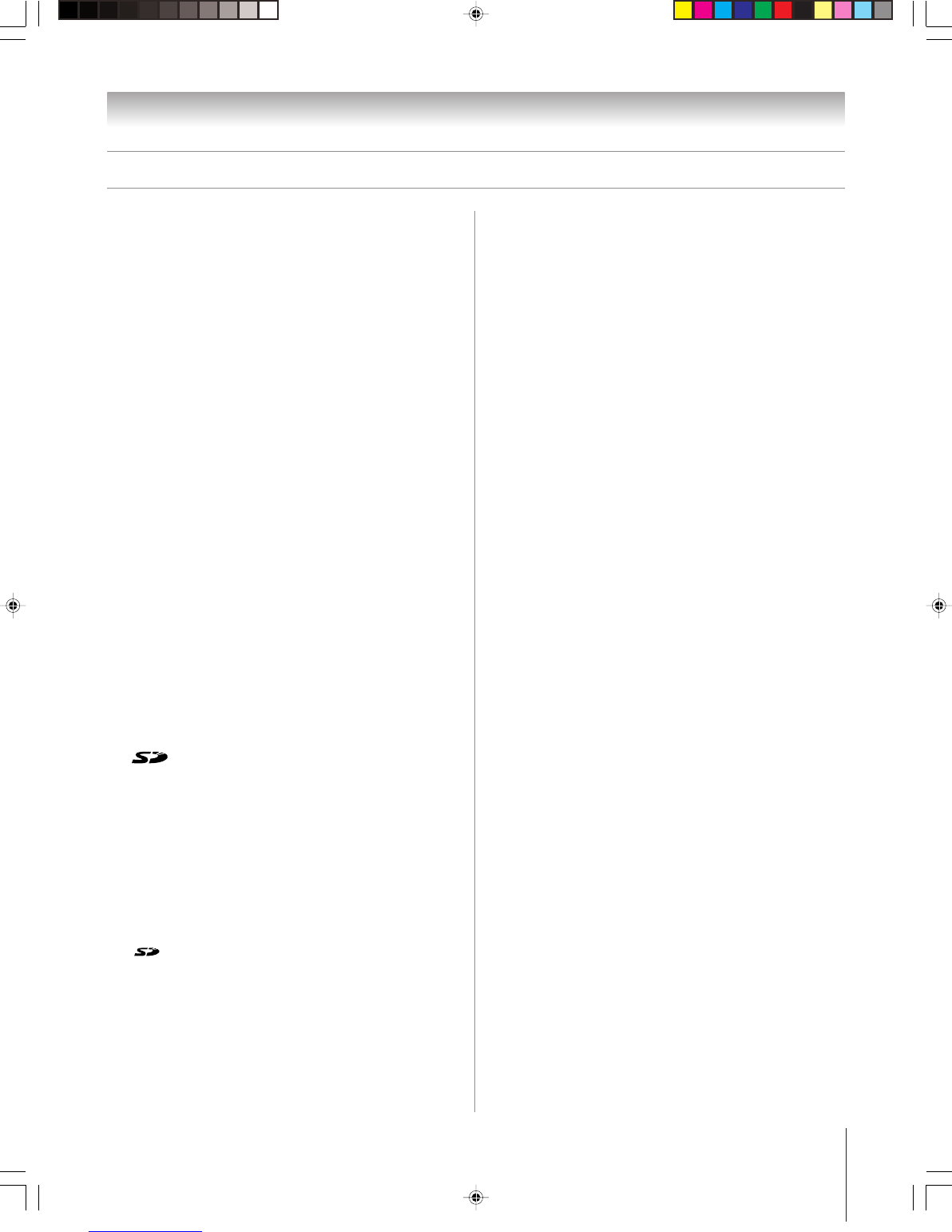
87
Copyright © 2005 TOSHIBA CORPORATION. All rights reserved.
Chapter 8: Using the TV’s features
Using the memory card JPEG picture viewer/MP3 audio player
You can use the memory card slots on the TV side panel to view
compatible JPEG files or play compatible MP3 files stored on a
memory card (see “Memory card specifications” below and at
right). You can display JPEG files in thumbnail mode or view
them as a slide show.
Note:
• Never remove the memory card or turn off the TV while
using the memory card. Doing so may result in loss of data
and/or damage to the memory card and/or TV. SUCH DAMAGE
IS NOT COVERED BY YOUR TOSHIBA WARRANTY.
• It is recommended that you back up your memory card data. Toshiba
is not liable for any damage caused by the use of any memory card
with this TV. Toshiba will not compensate for any lost data or
recording(s) caused by the use of such cards.
• For instructions on using your digital camera, refer to the owner’s
manual for your camera.
• For instructions on using your memory card, refer to the owner’s
manual for your memory card.
• Failure to take proper care of a memory card may prevent display of
pictures or playback of MP3 files from the card or result in damage to
the memory card and/or TV. SUCH DAMAGE IS NOT COVERED BY
YOUR TOSHIBA WARRANTY. See “Memory card care and
handling” on page 90.
• The technical criteria set out in this owner’s manual are meant as a
guide only.
• You must obtain any required permission from copyright owners to
download or use copyrighted content.Toshiba cannot and does not
grant such permission.
Memory card specifications
■
Supported memory card types:
– Memory Card (ver. 1.0)
– MMC (MultiMediaCard
™
)
– MemoryStick
™
(Pro)
– xD-Picture Card
™
(16MB-512MB)
– CompactFlash
®
memory card (Type1)
Note: The picture viewer and audio player support FAT16 formatted
cards only. Other memory card formats (including, but not limited to,
FAT32 and NTFS) are not supported.
______________
•
is a trademark.
• MMC and MultiMediaCard are trademarks of Infineon Technologies AG
and licensed to MMCA (MultiMediaCard Association).
• Memory Stick is a trademark of Sony Corporation.
• xD-Picture Card is a trademark of Fuji Photo Film Co., Ltd.
• Toshiba is an authorized licensee of the CompactFlash
®
and CF logo
®
registered trademarks.
■
Maximum memory card capacity:
512 MB.
■
Maximum displayable JPEG image size:
8 MB.
• JPEG files larger than 8 MB will not display.
■
Maximum MP3 file size: 50 MB
• MP3 files larger than 50 MB will not play.
■
Maximum displayable JPEG image resolution:
6000x4000
pixels.
■ Maximum number of files per directory:
370.
• All files over the 370th in a single directory will not display/play.
• Files in directories more than 10 levels down from the top level
directory will not display/play.
■
Maximum number of files per memory card:
JPEG = 1,000;
MP3 = 200.
• All JPEG files over the 1,000th on a single memory card will not
display.
• All MP3 files over the 200th on a single memory card will not play.
■
File name restrictions:
• File names cannot contain the following characters: \ / : ? “ < > | .
• File names must contain US-ASCII characters only.
• The maximum file name length is 255 characters.
• The memory card reader recognizes only “.mp3” and “.jpg”
file extensions.
• The MP3 player supports only ISO-8859-1 (US-ASCII/Western
European) character sets for MP3 meta-data (e.g, artist name,
album name, song title, etc.)
■
JPEG picture viewer:
• The picture viewer supports JPEG format images only.
• The files on your memory card must be in a file and directory
format compatible with the TV or they will not display on the TV.
• Images processed and/or edited on a personal computer (PC)
may not display properly or at all. Some digital cameras may store
images in a format that is not compatible with the TV.
■
MP3 audio player:
• The audio player supports MP3 format files only.
• The files on your memory card must be in a file and directory
format compatible with the TV or they will not play.
• Files processed and/or edited on a personal computer (PC) may
not play properly or at all. Some MP3 files may be in a format that
is not compatible with the TV.
• MP3 files must have the following format:
- MPEG1 (ISO/IEC 11172-3) Layer3.
- Sampling frequency—MPEG1: 32 kHz, 44.1 kHz, 48 kHz.
- Bitrate—MPEG1: 32–320 kbps.
- Channels—Stereo, Joint stereo, Dual channel, Single channel.
- ID3 Ver. 1, Ver. 2.
Downloaded from www.Manualslib.com manuals search engine



